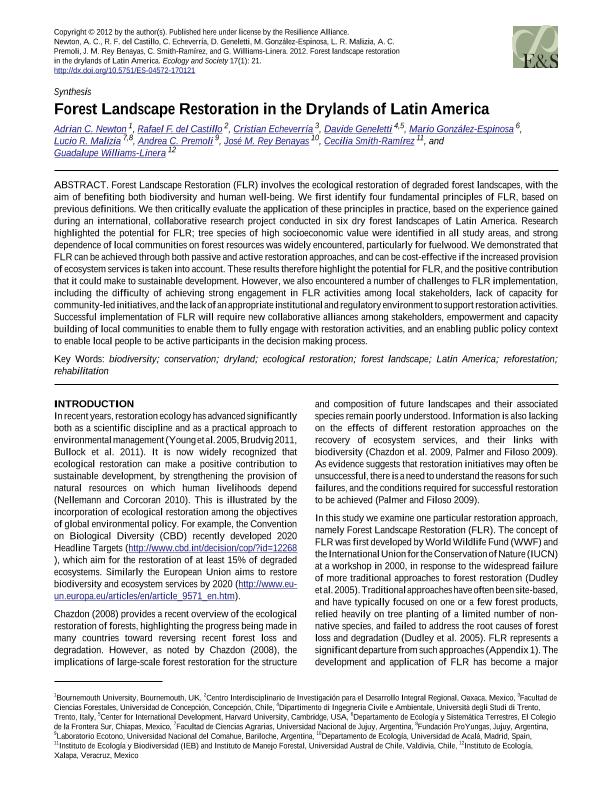Mostrar el registro sencillo del ítem
dc.contributor.author
Newton, Adrian C.
dc.contributor.author
del Castillo, Rafael F.
dc.contributor.author
Echeverría, Cristian
dc.contributor.author
Geneletti, Davide
dc.contributor.author
González Espinosa, Mario
dc.contributor.author
Malizia, Lucio Ricardo

dc.contributor.author
Premoli Il'grande, Andrea Cecilia

dc.contributor.author
Rey Benayas, José M.
dc.contributor.author
Smith Ramírez, Cecilia
dc.contributor.author
Williams Linera, Guadalupe
dc.date.available
2019-05-13T22:59:37Z
dc.date.issued
2012-03
dc.identifier.citation
Newton, Adrian C.; del Castillo, Rafael F.; Echeverría, Cristian; Geneletti, Davide; González Espinosa, Mario; et al.; Forest Landscape Restoration in the Drylands of Latin America; Resilience Alliance; Ecology and Society; 17; 1; 3-2012; 1-20
dc.identifier.issn
1708-3087
dc.identifier.uri
http://hdl.handle.net/11336/76240
dc.description.abstract
Forest Landscape Restoration (FLR) involves the ecological restoration of degraded forest landscapes, with the aim of benefiting both biodiversity and human well-being. We first identify four fundamental principles of FLR, based on previous definitions. We then critically evaluate the application of these principles in practice, based on the experience gained during an international, collaborative research project conducted in six dry forest landscapes of Latin America. Research highlighted the potential for FLR; tree species of high socioeconomic value were identified in all study areas, and strong dependence of local communities on forest resources was widely encountered, particularly for fuelwood. We demonstrated that FLR can be achieved through both passive and active restoration approaches, and can be cost-effective if the increased provision of ecosystem services is taken into account. These results therefore highlight the potential for FLR, and the positive contribution that it could make to sustainable development. However, we also encountered a number of challenges to FLR implementation, including the difficulty of achieving strong engagement in FLR activities among local stakeholders, lack of capacity for community-led initiatives, and the lack of an appropriate institutional and regulatory environment to support restoration activities. Successful implementation of FLR will require new collaborative alliances among stakeholders, empowerment and capacity building of local communities to enable them to fully engage with restoration activities, and an enabling public policy context to enable local people to be active participants in the decision making process.
dc.format
application/pdf
dc.language.iso
eng
dc.publisher
Resilience Alliance

dc.rights
info:eu-repo/semantics/openAccess
dc.rights.uri
https://creativecommons.org/licenses/by-nc/2.5/ar/
dc.subject
Biodiversidad
dc.subject
Conservación
dc.subject
Restauración
dc.subject
Latinoamérica
dc.subject
Reforestación
dc.subject
Rehabilitación
dc.subject.classification
Otras Ciencias Biológicas

dc.subject.classification
Ciencias Biológicas

dc.subject.classification
CIENCIAS NATURALES Y EXACTAS

dc.title
Forest Landscape Restoration in the Drylands of Latin America
dc.type
info:eu-repo/semantics/article
dc.type
info:ar-repo/semantics/artículo
dc.type
info:eu-repo/semantics/publishedVersion
dc.date.updated
2019-04-23T15:02:15Z
dc.journal.volume
17
dc.journal.number
1
dc.journal.pagination
1-20
dc.journal.pais
Estados Unidos

dc.journal.ciudad
Nueva York
dc.description.fil
Fil: Newton, Adrian C.. Bournemouth University; Reino Unido
dc.description.fil
Fil: del Castillo, Rafael F.. Centro Interdisciplinario de Investigación para el Desarrollo Integral Regional; México
dc.description.fil
Fil: Echeverría, Cristian. Universidad de Concepción; Chile
dc.description.fil
Fil: Geneletti, Davide. Università degli Studi di Trento; Italia. Harvard University; Estados Unidos
dc.description.fil
Fil: González Espinosa, Mario. El Colegio de la Frontera Sur; México
dc.description.fil
Fil: Malizia, Lucio Ricardo. Universidad Nacional de Jujuy; Argentina. Fundación ProYungas; Argentina
dc.description.fil
Fil: Premoli Il'grande, Andrea Cecilia. Consejo Nacional de Investigaciones Científicas y Técnicas. Centro Científico Tecnológico Conicet - Patagonia Norte. Instituto de Investigaciones en Biodiversidad y Medioambiente. Universidad Nacional del Comahue. Centro Regional Universidad Bariloche. Instituto de Investigaciones en Biodiversidad y Medioambiente; Argentina
dc.description.fil
Fil: Rey Benayas, José M.. Universidad de Alcalá; España
dc.description.fil
Fil: Smith Ramírez, Cecilia. Universidad Austral de Chile; Chile
dc.description.fil
Fil: Williams Linera, Guadalupe. Instituto de Ecología; México
dc.journal.title
Ecology and Society

dc.relation.alternativeid
info:eu-repo/semantics/altIdentifier/doi/http://dx.doi.org/10.5751/ES-04572-170121
dc.relation.alternativeid
info:eu-repo/semantics/altIdentifier/url/https://www.ecologyandsociety.org/vol17/iss1/art21/
Archivos asociados
